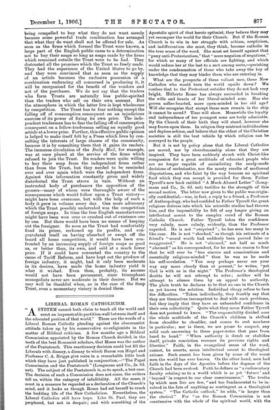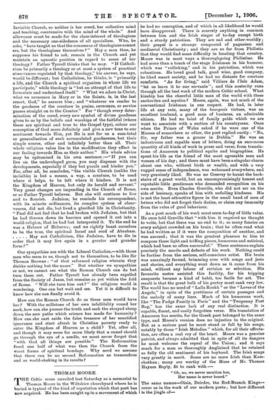LIBERAL ROMAN CATHOLICISM.
"A SYSTEM cannot both claim to teach all the world and erect an impenetrable partition-wall between itself and the educated portion of that world." These are the words of a Liberal Roman Catholic pleading against the obscurantist attitude taken up by his conservative co-religionists in the matter of Biblical criticism. A few months ago a Biblical Commission appointed by the Roman Church decided, in the teeth of the best Romanist scholars, that Moses was the author of the Pentateuch. This reactionary decision could but fill the Liberals with dismay, a dismay to which Baron von Hugel and Professor C. A. Briggs give voice in a remarkable little book which they have just published in conjunction,—" The Papal • Commission and the Pentateuch" (Longmans and Co.,, 2s. 6d. .net). The subject of the Pentateuch is, so to speak, a test case. The decision of such a Commission does not come, the writers tell us, within the category of infallibility. All the same, it must in a measure be regarded as a declaration of the Church's .mind, and it looks as though Rome had set herself to crush the budding life of the New Catholicism. Nevertheless, the Liberal Catholics still have hope. Like St. Paul, they are perplexed, but not in despair; and with something of the Apostolic spirit of that heroic optimist, they believe they may yet reconquer the world for their Church. But if the Roman Church is to win in her struggle with schism, scepticism, and indifferentism she must, they think, become catholic in the true sense of the word. She must set herself against that "puny anti-Protestantism," that " mere negation of negations," for which so many of her officials are fighting, and which would reduce her at the last to a sect among sects,—perishing under the condemnation of those who take away the key of knowledge that they may hinder them who are entering in.
What are the prospects of these valiant men, these New Catholics who would turn the world upside down ? We confess that to the Protestant outsider they do not look very bright. Hitherto Rome has always succeeded in breaking the wills and hearts of her liberal-minded sons. Has she grown softer-hearted, more open-minded in her old age ? Will she recognise that except these men remain in the ship it cannot be saved ? Time will show. Meanwhile the loyalty and independence of her youngest sons are truly admirable. By the Church of their birth they will stand,, however she may frown upon them. In religion they mistrust individualism and deplore schism, and believe that the oldest of the Christian societies is still the best vehicle by which religion can be conveyed to the people.
But it is not by policy alone that the Liberal Catholics are moved, nor by churchmanship alone that they are inspired. They have been suddenly struck with Christ-like compassion for a great multitude of educated people who are no longer capable of assimilating the ready-made decisions of ecclesiastics, nor the musty results of mediaeval disputations, and who faint by the way because no spiritual food which they can accept is provided for them. Father Tyrrell's new book entitled "A Much-Abused Letter" (Long- mans and Co., 2s. 6d. net) testifies to the strength of this second motive. The letter now given to the public was origin- ally confidential,—was, in fact, a reply to a friend, a Professor of Anthropology, who had confided to Father Tyrrell the great religious distress into which his 'scientific studies had thrown him, and the impossibility he felt of any longer giving an intellectual assent to the complex creed of the Roman Catholic Church. Father Tyrrell takes the confidence very calmly, more calmly, evidently, than the Professor expected. He is not " surprised " ; he has seen too many in like case. He is not "shocked," as though his estimate of a friend's "moral worth had suddenly been proved false or exaggerated." He is not "alarmed," not half so much "alarmed" as his correspondent, for he sees no reason to fear that he will ever be "less sincere and conscientious and essentially religious-minded" than he was as he made his self-revelation. "You may perhaps never see your way any more clearly than at present," he writes, "yet God is with us in the night." The Professor's theological doubts he will not attempt to solve ; neither will he attempt to silence them by an appeal to authority. The plain truth he declares to be that no one in the Church as yet • knows the solution. Individual clergy refuse to face the difficulties. "Taken individually, they frankly say that they are themselves incompetent to deal with such problems, but they imply that they have an unbounded confidence in their own collectivity." Quite what they mean Father Tyrrell does not pretend to know. "The responsibility divided over the whole multitude of the Church's children is shifted from shoulder to shoulder, and comes to rest nowhere in particular; nor is there, we are prone to suspect, any 'solid cash answering to these paper-notes that pass from hand to hand." "When authority is dumb or stultifies itself, private conviction resumes its previous rights and liberties." Faith, in the evangelical sense of the word, cannot, he asserts, mean intellectual assent to theological axioms. Such assent has been given by some of the worst men the world has ever known. On the other hand, men had faith in the days of the Apostles before the dogmas of the Church had been evolved. Faith he defines as "a rudimentary faculty relating us to a world which is as yet 'future' and ' beyond ' in respect to our clear consciousness." The truths by which men live are few, "and too fundamental to be in- volved in the fate of anything so contingent as a theological system." "The Catholic outlook," be adds, "is larger than the clerical." For "as the Roman Communion is not coextensive with the whole of the spiritual world, with the Invisible Church, so neither is her creed, her collective mind and teaching, coextensive with the mind of the whole." And allowance must be made for the class-interest of theologians and the necessary one-sidedness of all specialism. Who, he asks, "have taught us that the consensus of theologians cannot err, but the theologians themselves ? " May a man then, he supposes his friend to ask, remain in the Church and yet maintain an agnostic position in regard, to some of her theology ? Father Tyrrell thinks that he may. "If Catholi- cism be primarily a theology or at most a system of practical observances regulated by that theology," his answer, he says, would be different; but Catholicism, he thinks, is "primarily a life, and the Church a spiritual organism in whose life we participate," while theology is "but an attempt of that life to formulate and understand itself." "What we adore in Christ, what we reverence in Mary or in the Saints, .is, in the last resort, God," he assures him ; and "whatever we render to the goodness of the creature in praise, reverence, or service passes straight on to the Creator." For "though every deter- mination of the creed, every new symbol of divine goodness given to us by the beliefs and worships of the faithful (where these are spiritual and true to the Gospel type), colour our conception of God more definitely and give a new tone to our sentiment towards Him, yet He is not for us a sum-total or generalisation of such accumulated goodnesses, but their simple source, other and infinitely better than all. Their whole religious value lies in the modification they effect in our feeling towards Him as their author." His Whole advice may be epitomised in his own sentence :—" If you can live on the undeveloped germ, you may dispense with the developments, especially if they but puzzle and hinder you." For, after all, he concludes, "the visible Church (unlike the invisible) is but a means, a way, a creature, to be used where it helps, to be left where it hinders. It is not the Kingdom of Heaven, but only its herald and servant." Very great changes are impending in the Church of Rome, or so Father Tyrrell believes. But she will continue to live and to flourish. Judaism, he reminds his correspondent, with its minute ordinances, its .complex system of obser- vances, did not die, but lived a glorified life in Christianity. "Paul did not feel that he had broken with Judaism, but that be had thrown down its barriers and opened it out into a world-religion, that he had but interpreted it. To the end he was a Hebrew of Hebrews ; and we rightly boast ourselves to be the true, the spiritual Israel and seed of Abraham.
May not Catholicism, like Judaism, have to die in order that it may live again in a greater and grander form ? 7 Our sympathies are with the -Liberal Catholics,—with those men who seem to us, though not to themselves, to be like Sir Thomas Browne : "of that reformed religion wherein they dislike nothing but the name." But whether we sympathise or not, we cannot see what the Roman Church can do but turn them .out. Father Tyrrell haa already been expelled from the Society of Jesus, but remains as yet within the .fold of Rome. "Will she turn him out ?" the religious world is wondering. One can but wait and see. Yet it is difficult to know how she can finally avoid it.
How can the Roman Church do as these men would have her? With the millstone of her own infallibility round her neck, how can she pursue the truth and seek the strayed sheep down the new paths which science has made for humanity ? How can she cast aside the false treasure of her sanctified ignorance and start afresh in Christian poverty ready to enter the Kingdom of Heaven as a child ? Yet, after all, and though it may seem far more likely that a camel should go through the eye of a needle, we must never forget that "with God all things are possible." The Reformation freed one half of what was then the Church from the worst forms of spiritual bondage. Why need we assume that there can be no second Reformation as tremendous and as world-shaking in its results ?































































 Previous page
Previous page